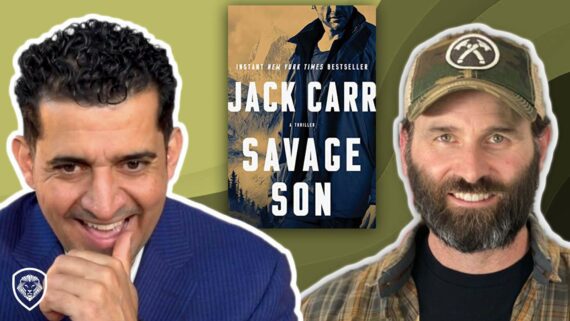How many times have you heard experts tell you, “Never compete. Competition is for losers. Go find a monopoly and dominate it.” Or do this and do that. And then you’ll hear people saying, “I love competition. I want to beat you. I want to see you lose.” All this other stuff. So who’s right? Because this is a bi-polar relationship man. They’re polar opposites. Who is right?
So today I’m gonna give you some ideas, and either one or two of them is gonna click with you depending on what phase of your business you’re at, you’re a startup, maybe a midsize. I don’t know what you’re doing, maybe a 100 million, 500 million, maybe 6 million, maybe you’re doing 60 thousand a year.
But I want you to be thinking about competition in business in a completely different way, and by the time I’m done with the video and I’ve made my case to you about competition, I want to hear your thoughts. But throughout the process if I say anything that prompts a question, let us know.
So let’s get right into it.
Look. You have two enemies – two enemies – when it comes down to competition. And these two competitors are your main competitors you’ll ever face. One of them is on the inside, the other one is on the outside. Let me explain what I mean by this.
Ninety percent of your time ought to be focused on you looking at ways you can improve you and your company. Not what’s going on in the marketplace. Ninety percent is inside. Maybe 10 percent of the time is outside. Let me explain.
When I first started my own business, and we started off and we were expanding, I was in Northridge, California. I had left my practice company, and I started competing, and I’m just getting a ton of pressure from competitors. But at that time when I had just left, they were still emailing me their major private leadership conference calls that they were having that I could’ve gotten on. I had access to every single data that they had at that time. Ask me how many times I got on their conference calls. This many times. Zero. I never once got on the conference call. Never once logged onto their website. Why is that? Because I knew my biggest enemy is this mind getting distracted, and the more I’m spending time on the outside, I can’t focus on how to improve because my move is always predicated on their next move.
And if I’m always predicated on their next move, I’m not setting the stage. Let me explain to you what I mean by this. So think about it this way. If you’re watching this and you know somebody who wants to be an English teacher, let’s just say you go to college and get a degree. I want to be an English teacher. Awesome. What is a better place where you’re going to have fewer competitors for you to become an English teacher? California? Is it Chicago? Is it Texas? Is it Florida? Or is it Japan? What do you think. Is it Germany? Can you imagine you like in California, you get your degree and you go to Japan and say, “I want to start teaching English here.” Oh my gosh, absolutely, come on down. An American is willing to leave everything behind to come and be a teacher in Japan. You have no competition. How many Americans ever want to go to Japan and teach English? How many want to leave America and want to go to Germany?
But that is the ideal competition. You’re not fighting head-on. You’ll hear cocky guys go, “I’m gonna fight you head-on, and I’m gonna kick your butt.” Really? Even in fighting the toughest guys in the world who fight, they don’t fight head-on. For instance, if I’m a boxer and an opponent I’m fighting, it’s an MMA fight, he’s a Jujitsu expert. My goal is to do stand up fight, cause I can beat him. Because he’s fighting my fight. His goal is to get me on the ground, because if he gets me on the ground I’m done. I don’t have a Jujitsu game. He doesn’t have a boxing game, so every time he comes I gotta push him off and get one in. Every time I punch, he’s supposed to duck and get my legs and get me down and then do his stuff that he does, submissions that he does, to get me to tap out. But my goal is for him to play my game, and his goal is for me to play his game. This is why your number one focus ought to be on the inside. This is your biggest competition you will ever face. The more you’re focused on this, the bigger the chance you’ll have.
Having said that, you may say, “Okay Pat, so now what do I do? I want to build a massive business. I want to be all over the place.” Well listen. Five things you’re gonna be having to go through.
Number one is locally. You compete locally, then you compete state-wide, then you go regional, then national, then globally. Andrew and his parents have a popcorn company. They make popcorn. What’s the popcorn company called Andrew?
A: “Austin Gourmet Popcorn.”
Now are you guys from Dallas, or are you guys from Austin?
A: “Austin.”
You’re from Austin, so watch this. How many popcorn gourmet companies are there in DFW right here?
A: “Twenty or thirty.”
Twenty or thirty. How many in Austin?
A: “Two or three.”
Two or three, and one of them is who?
A: “Austin Gourmet Popcorn.”
How’s your parents’ business doing?
A: “Great.”
Because there’s business that’s coming into them because they don’t have a lot of competition, right? So locally, you gotta find a market locally that you can compete with in a way that you differentiate yourself from everybody else. A lot of times people already think that “I want to build a global business. Yeah, I want to build a national business.” Yeah, but you’re not even known locally. Let’s focus here first, then let’s go over here. “Yeah, yeah, but you don’t understand. But my product is a tangible product.”Okay, then that’s even more of a reason to start locally, cause if it’s tangible then you want to go global or national. You’ve got inventory. You’ve got all this other stuff. “Well my product is intangible. I can go to another market.” Yeah, but does it have regulations? What’s the state laws? What do you need to do to go to another place? What’s the speed of expansion?
So you yourself, I’m not giving you specific direction, I’m just telling you this is an area to be thinking about on how you’re gonna differentiate yourself here. Start off locally, then you go to all the other stuff. Let the other guys focus on going here fast, and then they run out of money or they’re too thin. It’s like going to war. How many generals have you read about when they would go to war and they’d have 10,000 soldiers, and they would say, “A thousand go here, a thousand go here, a thousand go here, a thousand go here, a thousand go here.” And they stretch them, and then all of a sudden they loses seven of the fights. They’ve got 7,000 people they lost. Stay tight. Stay strong. Go together, and then take this market and then go to get it, and take that market. Don’t spread them too thin. Same thing goes with wanting to compete in a marketplace.
Now, that’s one part to be thinking about. Next part to be thinking about. What area do you want to be competing with that differentiates yourself that others are not competing with? For instance, price. “Mine’s gonna be cheaper.” Okay, great. “I’m gonna beat them because I got a cheaper product.” What if somebody comes and has a cheaper product than you? “But I want to be even cheaper.” What if somebody comes in- “But I want to be cheaper.” You can’t compete there because Metro PCS. You’re not the cheapest ones. Someone’s always willing to go cheaper if that’s how you’re gonna be fighting.
We can have better service. That’s actually a good one. If you can do that and the service is so good that I walk away remembering it, I’m telling the story to other people. Maybe it’s gonna be experience. Maybe it’s gonna be quality of your product that’s just above everybody else. Maybe it’s the speed of delivery. Maybe it’s your marketing, the way you tell stories is better like Coca-Cola’s better at telling stories than maybe Pepsi is. Why do you always feel good when you see Coke? Cause their marketing is impeccable. Now some will say “Well Coca-Cola tastes a million times better. Or Pepsi tastes-“. They have very good marketing. McDonald’s sells good marketing.
For some people it’s regulation. What do I mean by regulation? Look, one thing most people sometimes ask me, “Pat, why is this bigger company that’s worth this much and the guy’s worth six billion, why is he giving money to the person that’s saying in the Presidential campaign that that person is gonna over-regulate their industry? Why would this guy give money to him? This makes no sense to me Pat.” It makes all the sense in the world. “What do you mean?” Because he’s giving money to this guy with the way for regulation to come out that helps him so the barrier to enter is tougher, so you can’t compete with him. So the bigger companies want more regulation so you can’t catch up to them any more. The bigger companies. The smaller guys that are coming out there like, “Dude, let’s get rid of regulation so I can compete.” The bigger company said, “No, no, no, no, no. We’re not working that hard again, man, cause we built this business. Over-regulate these young guys so they can’t catch up, cause we know how hard it is. Give them more regulation.” That’s their competition, right? So you gotta figure out a way if it’s gonna get more regulated here, how am I planning myself to make sure this and that- you’re thinking about that as well.
Here’s another thing to be thinking about when it comes to competition: Blue Ocean Strategy. If you haven’t read the book, you ought to read the book. It tells you four things: eliminate, decrease, increase, and create. So look at your industry, whatever industry you’re part of. How can you eliminate something that maybe other competitors are doing? Just get rid of it. Completely get rid of it. You know what? These guys are selling motorcycles and cars. We’re gonna get rid of the cars. We’re gonna focus purely on motorcycles. Great, you’re eliminating cars. While everybody’s focused on trucks or all this other stuff, we’re gonna get rid of trucks. We’re gonna focus on vans because we’re gonna after the family market. Whatever it is. Eliminate.
We’re gonna increase a certain part of the business. We’re gonna decrease something. Part of the business. And then we’re gonna create something that others are not doing. And this becomes your story that others don’t have. Myspace had music. Facebook doesn’t have music, and they don’t care whether you like it or not. They decreased and eliminated, right? Create a fan page. Myspace didn’t have fan page. All of these things, Yahoo to Google. Yahoo had horoscope and all this stuff. Google said we don’t care about horoscope. We’re gonna give you a box. They eliminated everything. This will never work. They eliminated. But then made it simple. Search was easy. They increased how easy it was for you to use it, and then boom, they grew. So you gotta be thinking about this as well in your own industry, whatever phase of your business you’re at. So again, I’m thinking out loud with you to give you some ideas hoping that something is gonna connect with you.
Next, study what’s working and what’s not working. There’s some things that’s not working in the marketplace. Study it. What is working, what’s not working.
Project future issues and opportunities. I think a lot of times people are so focused on what’s going on right now they forget about what is gonna be taking place the next few years. What new regulations could possibly come out? What’s gonna happen politically? What are some changes that’s gonna take place in your state, in your local area? Who’s the mayor? Get involved. Build a relationship with some of these guys that are involved in those areas. Maybe you can say, “In the future I think, what’s gonna happen, technology, this product’s gonna go away. I really think that’s gonna be going away. Technology’s really moving this way.” Start making some future projections yourself. Start thinking about it. What do you think’s gonna happen here? What do you think’s gonna happen here? So you’re thinking long term knowing how you can pivot properly to be prepared for some of those regulations and some of those opportunities.
The simplest way for me is to beat your prior best. Competition for me has been very simple, is to constantly focus on beating your prior best. You’ve heard me talk about this many times. If your number is $60,000 in a month, focus on beating 60k in a month. If your number is nine months in a row you’ve beaten the prior best, do ten months. If your number is for Thursday your biggest sale is $6,000, for Thursday beat $6,000 or $7,000. If you can stay focused on that part, you’re eventually gonna be increasing to your next thing. You know you’re competing when many of the people outside are focused on you because you’ve been focused on the inside game.
Know where you want to compete and differentiate. Know where you’re strong and where you’re weak. This goes back to fighting head on.
And then there’s long term thinking vs. short term thinking. So as you think about these things with competition, the more you can position yourself where everybody else is pivoting based on your moves, you’re winning. The more you’re positioning yourself where you’re constantly pivoting on- For instance, I’ll give you an example right now with basketball. Everybody in the NBA is changing their teams to learn how to face who? Golden State, right? Well what if a team says, “I’m gonna do it a completely different way. I’m gonna build around a massive center and defense, and I’m gonna shake them up. I’m playing a different game.” What if that happens? Someone’s making them pivot to them. If you keep trying to pivot to Golden State, you’re not gonna be winning.
So the idea about everything I’m telling you with competition is, figure out a way to go into a market where you’re not competing with everybody else. Figure out a way to go into a market where you’re all by yourself, and everybody is kinda looking at you as the expert. And you’re saying, “Look, you guys are big, but I’m not competing with you. I’m competing with this. And no one’s in this space. I’m creating this space. I’m doing this part here. I’m going after this market. You want to sell to these people. I’m not selling to them. I’m selling over here. You’re looking for this age. I’m looking for this age. You’re looking for this educational background. I’m looking for this-“, and no one’s paying attention to them. The more you find that niche, that part that no one’s going to, you end up creating your own opportunity that nobody else is competing with as well in that marketplace. So that’s what I would tell you to be thinking about with competition. Take care, everyone.





